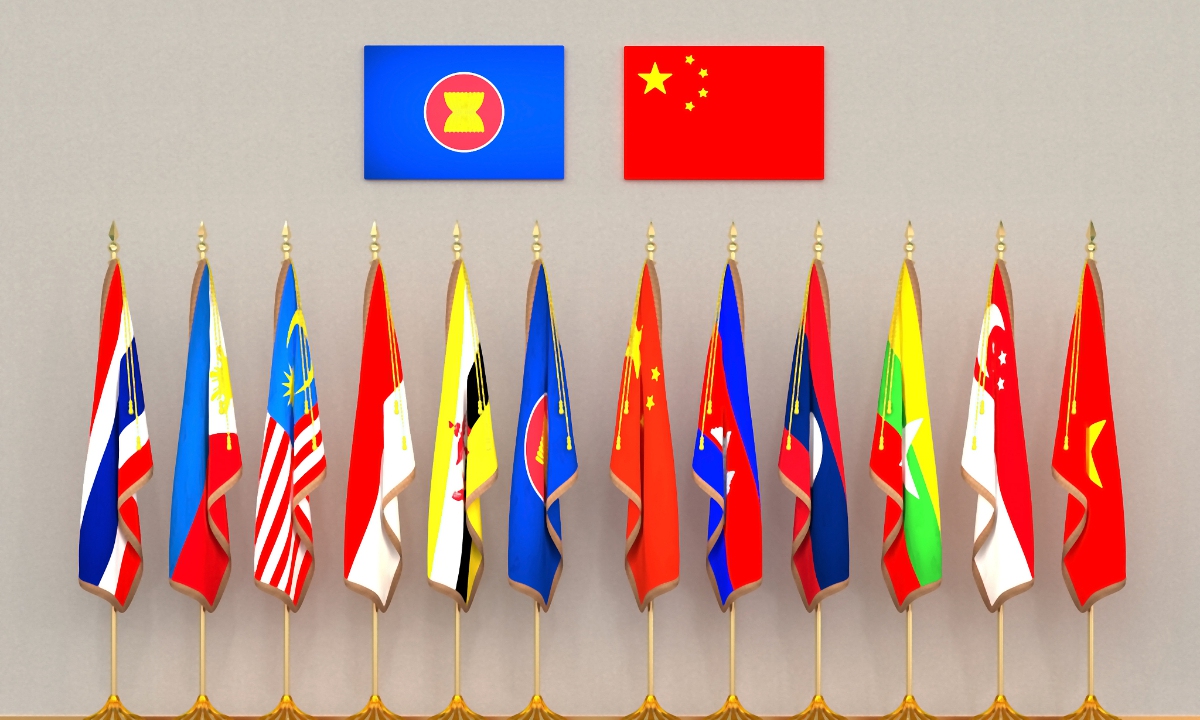
China ASEAN Photo:VCG
Many key members of ASEAN have held frequent engagements with China to reinforce and further develop the friendly ties to focus on joint development recently, while the US is trying to use the Philippines to hype up frictions in the South China Sea to interrupt the regional security situation and damage China's relations with the regional countries. Experts said the mainstream of the region is still about peace and development as the vast majority of the ASEAN share consensus with China to build a community with a shared future, and the vicious attempt of foreign forces is doomed to fail.
At the invitation of Member of the Political Bureau of the CPC Central Committee and Minister of Foreign Affairs Wang Yi, Deputy Prime Minister and Minister of Foreign Affairs of Laos Saleumxay Kommasith, Minister of Foreign Affairs of Vietnam Bui Thanh Son, and Minister of Foreign Affairs and Cooperation of Timor-Leste Bendito dos Santos Freitas will separately visit China from April 2 to 5 (Tuesday to Friday), the Chinese Foreign Ministry announced on Monday.
Wang Wenbin, Foreign Ministry spokesperson, made the remarks at a routine press conference on Monday, and he said that Southeast Asian countries are China's friendly neighbors connected by both land and sea, and important partners for Belt and Road cooperation. These countries and China have taken the lead in building a community with a shared future for mankind.
Apart from upcoming major diplomatic events between China and relevant ASEAN members, Indonesia, the major power of the ASEAN, has already made key engagements with China.
Chinese President Xi Jinping held talks with
President-elect of the Republic of Indonesia and Great Indonesia Movement Party General Chairman Prabowo Subianto in Beijing on Monday. Chinese observers said that Prabowo's visit to China has attracted widespread attention, and his decision to visit China shortly after winning Indonesia's 2024 presidential election on March 20 carries great significance, as this visit is crucial not only for the development of bilateral relations for at least next five years, but also injects positivity and stability into the whole ASEAN region.
China and Malaysia are planning to celebrate the 50th anniversary of the establishment of diplomatic ties in 2024, with observers expecting that the two countries will have a series of major diplomatic activities to further promote the ties of win-win cooperation based on high-level mutual trust and shared interests.
Xu Liping, director of the Center for Southeast Asian Studies at the Chinese Academy of Social Sciences, told the Global Times on Tuesday that the frequent engagements between China and so many key ASEAN members prove that China and the regional countries have strong foundation and consensus for cooperation, with China successfully inheriting the tradition of friendship to jointly build a community with a shared future with these partners.
"For instance, we are ideologically close with countries like Vietnam and Laos, and we also share similar political systems and strategic visions that could bring mutual benefits," Xu said.
Wang said on Monday that "Under the strategic guidance of heads-of-state diplomacy, the relations between China and Laos, Vietnam and Timor-Leste have entered a new era with higher quality and at a higher level. China and Laos are making active effort to deliver on the new action plan on building a community with a shared future. China and Vietnam are jointly building a community with a shared future that carries strategic significance. China and Timor-Leste are working to deepen the comprehensive strategic partnership."
China hopes that through the visits, we will further work with the three countries to follow through the guidance of the important common understandings between General Secretary and President Xi Jinping and leaders of the three Southeast Asian countries, build the China-Laos and China-Vietnam community with a shared future, achieve more deliverables under the new characterization of China-Timor-Leste relations, advance high-quality Belt and Road cooperation, and work for more practical results in the bilateral relations, Wang said.
China stands ready to work with Southeast Asian countries and other neighbors to leverage the opportunity of the 70th anniversary of the Five Principles of Peaceful Coexistence this year to enhance solidarity and cooperation, safeguard peace and tranquility and provide more positive energy and stability to the region and the wider world, Wang noted.
Some of these ASEAN countries who are making efforts to promote ties with China also have sovereignty disputes with China, but they have all pragmatically and wisely managed relevant issues with China by diplomacy, and even realize joint development in relevant areas. All of these show a very different image compared to the Philippines that is being used by the US to confront China on the issue of South China Sea, experts said.
"The peace and development are the mainstream of the region, and the decoupling and bloc confrontation are unacceptable for the region. And what the US can do to use the Philippines to interrupt the regional security situation and the China-ASEAN ties is very pointless and doomed to fail. We have confidence to safeguard the peace and stability and promote development in this region with our ASEAN partners with wisdom," said Li Haidong, a professor at the China Foreign Affairs University.




